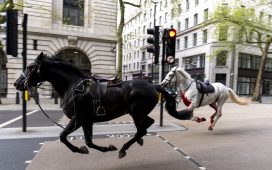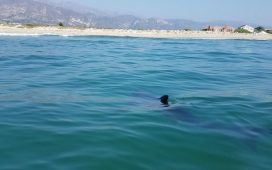The Senate has called on the Department of Agriculture to release dozens of outstanding reports from independent observers on live export ships, more than a year after some of those voyages have ended.
The calls comes amid concern from the RSPCA the department is presenting a “sanitised” account of the voyages in some of the summarised reports.
The Coalition introduced the requirement for independent observers on live export ships in April last year, after whistleblower footage of a ship taking sheep from Australia to the Middle East showed sheep suffering from extreme heat stress.
A subsequent three-month ban on shipments during the Middle Eastern summer could be extended to the end of September.
The Coalition backed the motion from the Greens senator Mehreen Faruqi on Wednesday, saying the observers were intended to provide greater transparency over the live export trade. Labor also backed the motion, which called on the government to release the outstanding reports and committed to releasing future reports in a timely manner.
Summary reports have only been completed for 20 of the 45 voyages for which an independent observer report was filed last year. No reports from 2019 have been published.
According to Vets Against Live Export, which has been requesting copies of the full observer reports under freedom of information laws, the summary reports frequently did not mention heat stress, even when the full reports show high wet bulb temperatures on deck or a significant number of mortalities caused by heat stress.
They have echoed concerns raised by the RSPCA about the reports.
The RSPCA has previously criticised the department for refusing to release video footage filmed by the observers. Information about heat stress risk assessment plans, a key part of improving live export policy, was also redacted.
“The RSPCA is very concerned about the extensive delays in publishing the summary observer reports,” RSPCA senior policy officer Jed Goodfellow said.
“The whole point of introducing the observer program was to improve transparency and get the ‘truth and proof’ about conditions onboard live export vessels. Having to wait up to a year before receiving a short, highly selective summary of the observer’s report is undermining the very purpose of the program.”
Goodfellow said that when the reports were released, they sometimes contained “positive editorial,” like a remark in a report on a shipment of sheep and cattle to the Middle East on the Al Shuwaikh in June 2018 which noted that the observer’s “three subsequent voyages on board the Al Shuwaikh have not identified any further problems regarding the potential smothering, and this will be monitored on an on-going basis.”
“The RSPCA also holds serious concerns over the sanitised nature of some of the summary reports,” Goodfellow said.
The department has said that all summary reports are approved by the independent observer in question before publication. Guardian Australia understands that concerns raised by observers about the nature of summaries was one of the reasons for the lengthy publication delay.
Faruqi said the government’s promised transparency system had “fallen apart just eight months after it was established.”
“It seems like the government is continuing to run interference for the live exports industry by delaying the release of these reports,” she said.
Faruqi said continued reference to heat stress and unsanitary conditions in the 2018 reports, despite regulators introducing measures designed to reduce those issues, showed the industry could not be reformed.
“This industry can’t be reformed, which is why we need to shut it down for good,” she said.
The department said it published the reports “as soon as practicable.”
“The timeframe to complete summary reports can vary depending on a number of factors, including the length of the journey,” a spokeswoman said.
“Un-redacted reports contain commercial-in-confidence information and will not be released as a matter of course … The summary reports accurately reflect what has been observed and are checked for factual correctness by the observer prior to publication.”








